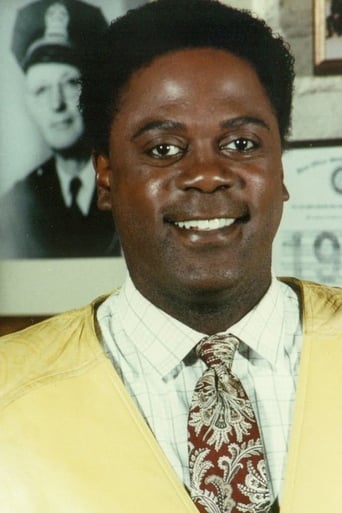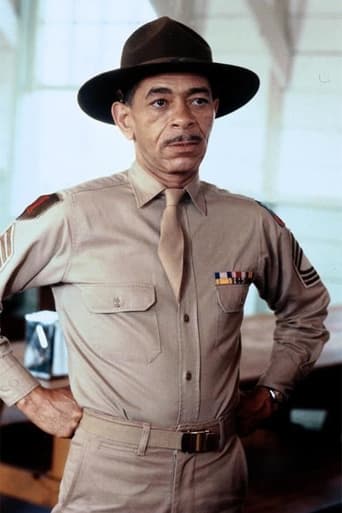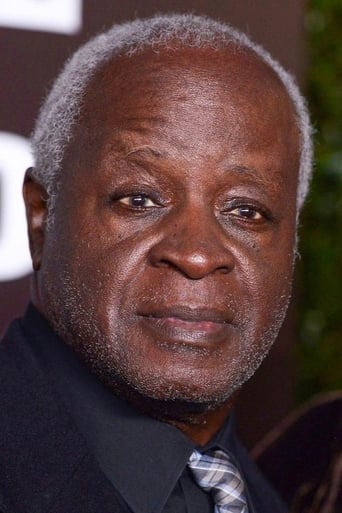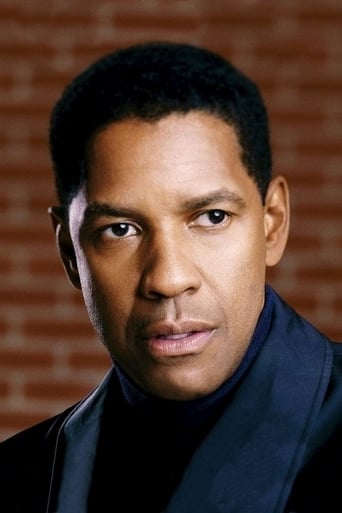sddavis63
This movie tries to do two separate and distinct things; one it does very well, the other is a so-so effort. As regards the latter, frankly, this isn't the most compelling murder mystery you're ever going to come across. On a US Army base made up of mostly black troops in Louisiana in 1944, a black sergeant is murdered, and the question is who did it. Many think it was local Klansmen who didn't like seeing a black man in a position of responsibility, but that theory is quickly rejected and in steps Captain Davenport (played by Howard Rollins) - a black lawyer/officer charged with solving the mystery. Most of the movie is told in flashbacks as Davenport questions the various soldiers on the base to try to unravel the mystery. Rollins was good in the role, and the movie paints a complex (and sometimes confusing) picture of Sgt. Waters, giving reasons for both liking and disliking him, and opening up the possibility that virtually everyone he came into contact with might have had some motive for wanting to kill him. The mystery around the killer's identity is indeed a mystery right up to the very end. There was no reason given to suspect any one character over another. Still, I wasn't especially drawn in by the murder mystery, and if that was all that was going on here this would have been a real disappointment. My sense, though, is that the murder mystery was really background to a bigger issue.What's interesting here is the racial study. What's interesting is watching the pride black soldiers felt in seeing a black officer for the first time. What's interesting is seeing the discomfort of white officers around how to react to a black officer. What's interesting is seeing the interactions between the black soldiers themselves, all trying in their own way to find a way to fit in and to advance at the same time - some asserting their racial identity, some feeling that to get ahead they had to become more like whites, and not always getting along with each other as they approach the racial issues in different ways. This was, indeed, an interesting look at what life might have been like on such a base at the time, and it was that part of the story that was really most interesting to me. The murder mystery was worth watching only insofar as it helped to highlight those racial issues that were ever-present.Of note, I suppose, is that this is one of the earliest roles played by Denzel Washington, as a private on the base who's one of the suspects in the murder because of a confrontation he had with Rivers. It's an important although not a huge role. Rollins was really the star of the movie, and he was very good. Adolph Caesar as Sgt. Rivers was good - perhaps a bit of a caricature of an army sergeant in some ways, but still quite good.
secondtake
A Soldier's Story (1984)Key here is the story, an attempt to give some exposure to problems of blacks in the military during WWII. That's commendable, and the movie makes it beautiful and on some level an accurate period piece. But there are too many obvious moments here, too many times where it seems that familiar (even for 1984) stereotypes are upended, or where justice is somehow being served to history. This gets in the way of some really fine performances, and in a way waters down the really important points, about the conflict of assimilation and equality for blacks in a military not ready for it, and in a culture (the deep South) completely resistant to it.A young Denzel Washington, and a seasoned Norma Jewison directing, at least make this movie worth watching, but neither rises to their best stuff. The set designer (and to some extent cinematographer) deserve credit for making a convincing setting for it all. And maybe most engaging, though also seemingly patched in for entertainment purposes, is Patti LaBelle as a searing blues performer, great to see.
zippyflynn2
Colonel Nivens: "The worst thing you can do, in this part of the country, is pay too much attention to the death of a Negro under mysterious circumstances." If "A Soldier's Story" had kept itself to this level, it probably would have done better at the box office, been considered more "daring" and "controversial" and been talked about as "a landmark film". It also probably would have been trendy, clichéd, one dimensional, and, of course, at least partially false. If you don't see something in its entirety, it's very easy to misunderstand it. For centuries people looked at the land around them and concluded the world was flat. A clear example of how the vast majority "sees" something that is irrefutable, yet in reality it is a lowest common denominator myth based in ignorance. "A Soldier's Story" is a much better film than to rely on such one or even two dimensional near-sightedness. The story and characters are motivated by life-like emotions and thoughts, so it is honest, meaningful and, not surprisingly, overlooked as one of the finest films to cover the subject of racism.It would be very convenient, and the solution for racism would be very easy, if all the blame for it could be attributed to a specific group of people from a specific area of a country; in this case the opening quote above refers to the whites who lived in and mostly controlled the southern United States during the 1940s. If the white people in the south were the entire cause of racism for black Americans then jailing, executing or somehow making them stop their terrible practices would be the simple solution for the blacks to live "happily ever after". But real adults know "happily ever after" only exists as a sweet, neat and tidy way to finish children's stories. Sometimes, however, even real adults can forget that the causes and therefore the solution to racism is not as simple, neat and convenient as we like to think and tell each other during our semi-thoughtful moods. For a start, like so many other undesirable things in societies and life, racism is so pervasive and entrenched that it becomes invisible even though it is constantly in our field of vision. A good example is when one of the black soldiers said "Sir, they lynched Jefferson the week I got here and two weeks after that-" and he doesn't finish the statement as he is interrupted by his C.O. The subject of his sentence, a previous racial murder, is dismissed as irrelevant to the current murder of that day. It is used as a "throw away line", something the characters and most of the audience quickly dismiss, for a variety of reasons, but mostly because underlying its dismissal is "Yeah, they lynched blacks back then with a regular frequency and your point is...?" Just as tragically, the attitude with which the character delivering the line is somewhat dismissive, or more correctly, defeatist, as in "Yeah, and what can we do about it? We're the ones being lynched and we ain't got the power. Just another one of us murdered." All of this is conveyed effectively by its brevity and casualness, just as it, sadly, is in real life. Not even a sub-plot, just a minor bit of story and character foundation, a throw-away line. That's the nature of something that is pervasive and entrenched, the majority believing the half truths or outright lies used to justify the actions more than the actions themselves; and the majority must be complicit in pervasive, institutional racism or it would not exist. Another thing real adults know is that black and white, in the human world, are concepts, ideas, there are no men who are all black, just as there are no men that are all white. Most men (and women) are gray, varying shades of black and white, just as probably no men are all good or all evil. And in and among these shades of gray is self-loathing and all types of racism, including racism with members of your own race. I think Groucho Marx was speaking for the common man when he said "I would not want to belong to any club that would have someone like me for a member." There is a great deal of detail in the many trees within this film but it is easy to miss much of it, partially because you're involved with the story (forest) and also because the subject is painful, pervasive and ignored as much as possible, even in the relatively safe confines of a movie. A really excellent film, like any form of art, will make you be more aware of reality, something we constantly obscure with our personal and social delusions. Another reason the depth of this movie can be missed is the presentation of the story. It is presented like a Hollywood film, in a formulaic-style package, which betrays the content. The presentation is a little slick but the subject, story and details are not, which is written by Charles Fuller, who also did the original play for which he won a deserved Pulitzer Prize. Not to disparage Norman Jewison at all, a man who has directed a number of great masterpieces, including the masterfully presented "In the Heat of the Night", which did not share quite the same intricate details of racism as this offering does. Perhaps this is just an example of how as wonderful as the movie medium can occasionally be it may lack in intellectual presentation when compared to the play or novel. Regardless, for what it offers, including outstanding performances all around, including the late but greats Adolph Caesar, Larry Riley, and, of course, Howard E. Rollins Jr., it doesn't get much better than "A Soldier's Story", a movie I recommend for multiple viewings to afford yourself the opportunity to see the pervasive racism within your world and self a little more clearly.
gsh999
I'm an Army vet of several years and I feel somewhat qualified to comment on the accuracy of the portrayal of the military in the movies. I completed basic training and lived and worked in the same type of Army wooden barracks as in "A Soldier's Story." I was subordinate AND superior, in rank, in the course of my career, to soldiers like the disciplinarian Sergeant Waters. Overall, I believe "A Soldier's Story" is an accurate portrayal of Army personnel and history. "A Soldier's Story" is also an extremely entertaining mystery. Movie-making at its finest!I am proud that the U.S. Army led the way in racial integration in U.S. history. These years were unduly difficult years for African American soldiers, who contributed greatly to the U.S. war effort. Not only did African American soldiers have to deal with enemy action abroad, they also had to contend with extreme and violent racism at home! "A Soldier's Story" depicts this part of American history in a gripping, entertaining, and touching manner. Highly recommended 10/10.









